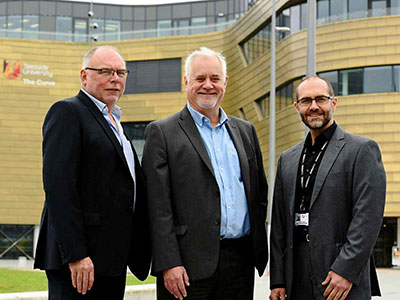Course overview
Food and drink manufacturing and processing (FDMP) is vital to the UK economy. It’s the single largest manufacturing sector in the UK, accounting for 20% of total manufacturing, with 468,000 people employed. The wider food and drink sector, including food supply chain from the ‘Farm to Fork,’ contributes over £120 billion to the economy and employs 4.1m people – roughly 13% of the entire UK workforce. Due to the reduction of free movement from the EU and Covid-19, the industry’s chronical skills gap continues to widen. The UK Commission for Employment and Skills reported the FDMP sector will need 140,000 recruits by 2024.
This programme offers both full-time and part-time study options and is accessible to recent graduates and those in employment. The blended learning method means that employers seeking to upskill and retain their best employees can do so with minimum time off work.
Teesside University is highly praised for the links it maintains with local and national industries and businesses such as Marlow Foods (Quorn), SK Chilled Foods and Sainsbury’s. The university is committed to integrating with industry in the Tees Valley and has a record of producing employment-ready problem solvers and innovators.
You may also be interested in our MSc Food Science and Biotechnology.
Course details
Course structure
Core modules
On successful completion of the taught modules, you proceed to a 60-credit advanced research project. The aim is to bring together all elements of the course to address a relevant food industry problem. The project provides you with the opportunity to develop original knowledge in a specific area of food science and biotechnology, enabling you to demonstrate your ability to challenge orthodoxy, demonstrate originality, plan and organise with significant autonomy and operate ethically in potentially unpredictable situations. You must produce a dissertation report and a poster as an assessment.
Develop knowledge of the chemical analysis of food, together with the major chemical changes during food processing and how these impact the quality and safety of food. Enhance your problem-solving abilities using food chemistry-related scenarios. You develop your knowledge and practical experiences of food chemical analysis using traditional and modern analytical techniques.?Delivered through lectures, seminars and practical sessions to support both the analysis of the scientific literature relating to this discipline and problem-solving.
Food Chain and Composition of Food
You are introduced to the structure of food supply chains and food systems in our sociality, and you explore the pathway of ‘Farm to Fork.’ Evaluate the resources and impact of the food supply chain, and analyse the impact of food policies on health, environment and economy. Understand the basic compositions of key food commodities, their impacts on human nutrition and society development, and the factors influencing these compositions throughout the food supply chain. The core content is delivered through lectures, with seminars used to facilitate student-directed debates on contemporary topics related to food supply chain and food systems.
Food Innovation and Product Development
You are introduced to the food product development process, and you explore the development of food manufacturing processes. Experience connecting with the real world by developing a new food product, either through an industrially based or linked project. Encounter challenges similar to those in the launch of a new food product from laboratory to table, including the consideration of full economic costs and the development of a business plan. Lectures are supported by a series of practical sessions where you integrate graduate research skills and develop entrepreneurship.
Develop the fundamental concepts of food processing including the basic principles of the mass and energy balance, designing a realistic process flow, the principles of hygienic design, and balancing the capacity, efficiency and cost to successfully plan a new food manufacturing plant. Explore a variety of strategies and methodologies, including the use of design software such as Visio and CAD, taking food production from benchtop production to a full-scale automated manufacturing process. Explore issues such as health, safety, environment and ethics facing the food production managers in the workplace.
Develop fundamental knowledge of food processing technologies, including primary food processing, raw ingredient preparation, ambient-temperature processing, thermal processing and preservation processing. Study the principles and development of novel food technologies from real-life research cases developed by our research scientists. Lectures and integrated tutorials/seminars are used to deliver the core concepts of the module – principles of existing and novel food processing technologies, discuss their advantages, limitations, and applications through case studies. Laboratory practice demonstrates your theoretical knowledge in practices and supports you to learn and develop the skills required by professionals working in this field.
A range of traditional and emerging technologies employed to ensure the safety of food are introduced. Explore a range of current food-related safety issues, including the analysis of risk, and review current hygiene practices in the food industry. Examine the implementation, auditing and evaluation of appropriate processes and procedures or controls to affect the safe processing of foods. This module also enables you to synthesise and critically appraise different aspects of food safety technologies and management in complex contexts.
Modules offered may vary.
How you learn
The transition to postgraduate-level study can be challenging, so supporting you to make this step is an important element of this programme.
You gain support during the programme induction and within the Advanced Research Project module to help you understand the requirements of academic study at postgraduate level, enhance your skills in academic writing and referencing. You are supported to develop the skills necessary to operate professionally, safely and ethically in planning and implementing a master’s-level research project.
By including work-based problem-solving projects and case study exercises, this programme emphasises real-world working, helping to blend theory and knowledge in the context of business. This allows you to develop the skills employers are seeking to set you on a successful career path. Blended learning provides a rich and varied learning experience and additional flexibility if you are in employment.
On campus, you have access to a dedicated food product development laboratory and a pilot-scale processing equipment facility, allowing you to gain valuable hands-on experience in food processing and product development. Fully equipped microbiological and chemical analysis laboratories enable you to undertake a series of relevant practical investigative projects, where you explore a range of ingredients and food products.
How you are assessed
You are assessed on subject knowledge, independent thought and skills acquisition.
Assessment may include:
• examinations
• oral presentations
• technical interviews
• technical reports
• laboratory reports
• literature surveys, evaluations and summaries
• dissertation or thesis (MSc only).
You are presented with an assessment schedule providing details of the submission deadlines for final assessments.
Entry requirements
Normally you will have at least a second-class honours (2.2) degree from a UK university or a non-UK equivalent qualification in an appropriate subject. Examples of suitable first degree subjects include any life or physical science, engineering or mathematics.
Other first degree subjects may be acceptable. Please contact the Admissions Office to check your eligibility.
Students with a degree awarded outside the UK must also meet the University's minimum English language requirements.
Non-EU international students who need a student visa to study in the UK should check our web pages on UKVI-compliant English language requirements. The University also provides pre-sessional English language courses if you do not meet the minimum English language requirement.
For general information please see our overview of entry requirements
International applicants can find out what qualifications they need by visiting Your Country
Employability
Career opportunities
The Food and Drink Federation (FDF) estimated there are over 500,000 job vacancies in the wider sector. This is great opportunity for the next generation of talent to study towards a rewarding career.
Graduates can seek jobs in many areas in the food sector including:
• food processing engineering
• new product development
• quality management and food safety management
• food production management
• technical management.
Information for international applicants
Qualifications
International applicants - find out what qualifications you need by selecting your country below.
Select your country:
Useful information
Visit our international pages for useful information for non-UK students and applicants.




